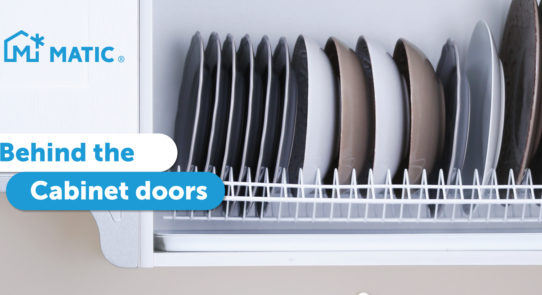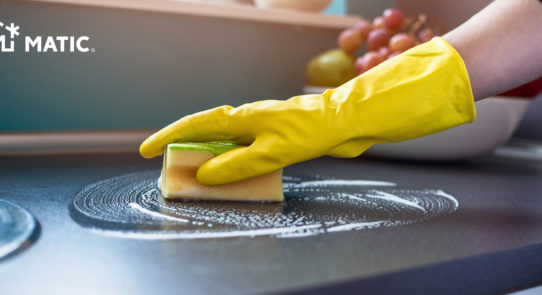
While Arab countries might widely vary in many traditions and aspects, most of them agree to the great good: cleanliness. Maintaining perfect personal hygiene and a well-cleaned home is essential in the Arab culture. This dates back to their history in inventing cleaning means, in addition to Islamic beliefs where a person is required to be pure and clean – both spiritually and physically.
Discover with Matic the Arab cleaning culture and interesting facts related to their hygienic practices.
– The Shoes Ban
Arab Etiquette 101: take your shoes off before stepping into an Arab household.
It is somewhat unpleasant for an Arab to walk inside their home with shoes on. This rooted habit traces back to Muslims’ obligation in taking off their shoes before entering a mosque or a praying space. Since most rooms in home can be a praying space, “the shoes ban” entails the house to maintain sanitary. Keeping the home pure means not stepping on its floors or carpets with shoes that collected bacteria and filth from the streets. Better be preventative in your lifestyle!
– The Arab Air Freshener: “Bakhour”
No air freshener beats the mighty “bakhour” (incense).
Bakhour is passed in every room in the house on Fridays as a tradition. It is also used after cleaning and whenever there is a bad smell. Unlike commercial air fresheners that are loaded with toxic chemicals, bakhour is natural and safe. Time to embrace Arab things!
– Indulge in Soap
You would see soap everywhere in an Arab household. Soap is extremely essential in the Arab culture which roots back to some chemistry history!
Arabs created soap by mixing oil (usually olive oil) with “al-qali”, a salt-like substance. This was then boiled to achieve the right mix, left to harden and used in the hammams, the bath houses.
Arabic soap is natural and chemical free, keeping your skin soft and nice. Time to embrace Arab things pt. 2!
– Toothbrush of Arabia: The Miswak
The Miswak/Siwak is a teeth cleaning twig made from the Salvadora persica tree, known as Arāk in Arabic. The miswak’s soft bristles act like a toothbrush with natural built-in ingredients that act as antimicrobial and a mild bleach.
While Arab countries might widely vary in many traditions and aspects, most of them agree to the great good: cleanliness. Maintaining perfect personal hygiene and a well-cleaned home is essential in the Arab culture. This dates back to their history in inventing cleaning means, in addition to Islamic beliefs where a person is required to be pure and clean – both spiritually and physically.
Discover with Matic the Arab cleaning culture and interesting facts related to their hygienic practices.
– The Shoes Ban
Arab Etiquette 101: take your shoes off before stepping into an Arab household.
It is somewhat unpleasant for an Arab to walk inside their home with shoes on. This rooted habit traces back to Muslims’ obligation in taking off their shoes before entering a mosque or a praying space. Since most rooms in home can be a praying space, “the shoes ban” entails the house to maintain sanitary. Keeping the home pure means not stepping on its floors or carpets with shoes that collected bacteria and filth from the streets. Better be preventative in your lifestyle!
– The Arab Air Freshener: “Bakhour”
No air freshener beats the mighty “bakhour” (incense).
Bakhour is passed in every room in the house on Fridays as a tradition. It is also used after cleaning and whenever there is a bad smell. Unlike commercial air fresheners that are loaded with toxic chemicals, bakhour is natural and safe. Time to embrace Arab things!
– Indulge in Soap
You would see soap everywhere in an Arab household. Soap is extremely essential in the Arab culture which roots back to some chemistry history!
Arabs created soap by mixing oil (usually olive oil) with “al-qali”, a salt-like substance. This was then boiled to achieve the right mix, left to harden and used in the hammams, the bath houses.
Arabic soap is natural and chemical free, keeping your skin soft and nice. Time to embrace Arab things pt. 2!
– Toothbrush of Arabia: The Miswak
The Miswak/Siwak is a teeth cleaning twig made from the Salvadora persica tree, known as Arāk in Arabic. The miswak’s soft bristles act like a toothbrush with natural built-in ingredients that act as antimicrobial and a mild bleach.
It is famous in the Arab world due to the availability of the trees that miswak twigs are extracted from. Additionally, it became famous among Muslims due to narrations (hadiths) by the Prophet about its daily use importance.
These Arab cleaning habits are still used in modern houses today, and if you’re still committed to them, then don’t forget to teach them to your favorite cleaner on our next booking from MATIC!

You know deep inside what lies behind your cabinet’s doors. If it’s not seen, it doesn’t mean it’s not there. You try to pull out a pan and a crash of pots & containers surprises you. Storing your kitchen utensils is essential to save you effort in grabbing your target, time, and space. End […]
Read article
Having a disorganized fridge is a waste of money and food. With a messy fridge, the food is shoved in places you can’t spot, which means that some will be spoiled and tossed in the trash. Additionally, having spoiled food is a welcoming invitation for bacteria to live in your fridge! A disarrayed fridge consumes […]
Read article
With the right temperature and nutrients, bacteria are set to grow & live happily like other living things. They spread from person to person and to surfaces depending on factors like surface type, living habits, cleaning procedures, and lifestyle practices. Meet the top places at your home that attract bacteria like a magnet, surely followed […]
Read article


 -
-


